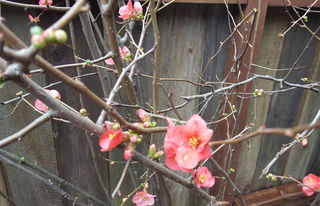Beauty
Finding Hope in Dark Times
A moment of beauty can be transformational.
Posted February 8, 2017

The flowering quince blossoms by my front gate bring their bright beauty to the darkness of winter. Why do these small blossoms affect me so deeply, more than the profusion of wildflowers, honeysuckle, and roses on long summer days? When most of the trees and shrubs are bare, these tiny rose-colored blossoms are a rare exception, a harbinger of hope.
Rushing from one task to another, moving mindlessly through our days, we can become habituated to the good and beautiful in our lives (Siegel, 2007). We focus instead on what’s wrong with our world, our jobs, our health and relationships, caught up in what Shakespeare called “the thousand natural shocks that flesh is heir to” (Hamlet, 3.1.64-65).
But a moment of unexpected beauty can wake us up. Winter blossoms, a shaft of sunlight through the clouds, or a rainbow arching overhead can fill us with a sense of awe (Keltner & Haidt, 2003) and gratitude (Emmons, 2016). These positive emotions can heal us, activate our immune systems, broaden and build our personal resources, and enable us to see new possibilities (Fredrickson, 2001). As Emerson, Thoreau, and centuries of poets have realized, a moment of beauty can transform our whole world view.
So if you’re experiencing “the winter of our discontent” (Richard III, 1.1.1), slogging through these dark days, look around you at the natural world to experience the healing power of beauty.
References
Emmons, R. A. (2016). The little book of gratitude: Create a life of happiness and wellbeing by giving thanks. New York, NY: Hachette.
Fredrickson, B. (2001). The role of positive emotions in positive psychology. American Psychologist, 56, 218-226.
Greenblatt, S. (Ed.). (1997). The Norton Shakespeare. New York, NY: W.W. Norton & Company. All Shakespeare quotes from this text.
Keltner, D., & Haidt, J. (2003). Approaching awe, a moral, spiritual, and aesthetic emotion. Cognition and Emotion, 17, 297-314.
Siegel, D. J. (2007). The mindful brain: Reflection and attunement in the cultivation of well-being. New York, NY: W.W. Norton & Company.
***********************************
Diane Dreher is a best-selling author, positive psychology coach, and professor at Santa Clara University. Her latest book is Your Personal Renaissance: 12 Steps to Finding Your Life’s True Calling.
Visit her web sites at http://www.northstarpersonalcoaching.com/ and www.dianedreher.com


